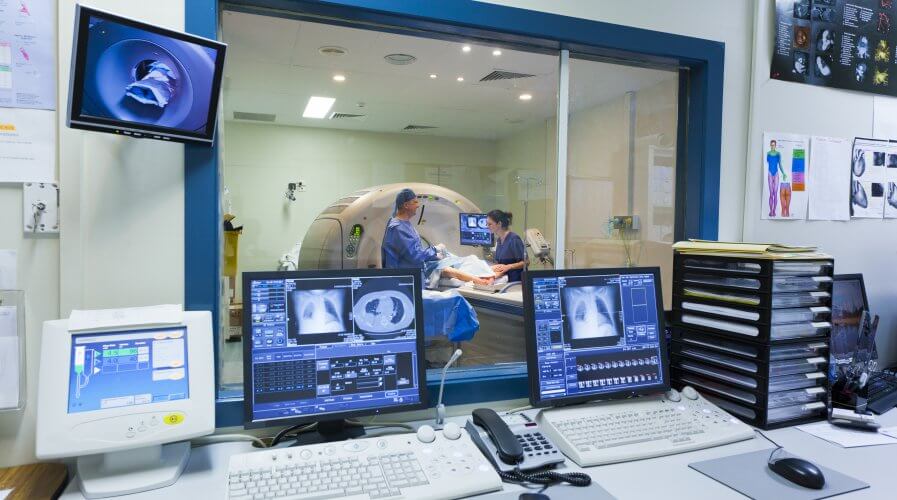
Digital transformation has allowed Raffles Medical Group to increase patients’ safety and healthcare in general. Source: Shutterstock
Charting Raffles Medical’s digital journey to better patient care
IN the last decade or so, digital transformation has become a priority for every organization, across all industries.
However, companies embarking on digital transformation projects know that the digital journey is not completed overnight and ultimately, all initiatives that are implemented have to deliver measurable value to the consumers.
That was definitely the case for Raffles Medical Group (RMG) when the Singapore based healthcare provider began its digital transformation journey.
Speaking exclusively to Tech Wire Asia, RMG Group Commercial Director Jessica Tan said that primary motivation for the group to leverage technology and start the digital journey was to enhance the quality of patient care, as well as to provide its patients with more connected healthcare.
“This will allow doctors and healthcare professionals to achieve better health outcomes and for patients to get seamless treatment,” Jessica said.
Digital initiatives to enhance CX
To that end, on top of making all medical records digital, RMG has ensured interoperability of those electronic records by unifying their systems.
Known as the Raffles Clinic Management System or RCMS, the universal system has allowed, for instance, a patient visiting both general practitioner and specialist, to have a single outpatient medical record.
The hospital has also deployed an ERP solution to streamline the dispensary and other related transactions for the patients.
Beyond that, RMG is also creating a better omnichannel experience for its patients with its e-commerce platform, where patients can shop and compare various health supplements, products, and services such as screening packages and vaccinations.
“Customers can make purchases online and redeem them physically at their preferred clinics, creating a seamless experience rather than making their way to the physical store to make an initial inquiry,” said Roy Wee, Deputy Director, Digital Transformation at RMG.
“Similarly, making an appointment with our specialists as well as health screening services can be done via our website and app. Patients can also obtain various other health information on these platforms,” added Roy.
Meaningful impact
“Patients’ safety has been greatly improved due to the unified drug and service codes,” said Matthew Yong, Director of IT at RMG.
According to him, automating many repetitive tasks and processes has minimized transcription errors, while one medical record per patient reduces the chances of doctors overlooking patient’s vital information such as prior histories and allergies.
Though, implementing these initiatives was not without challenges. Roy, who oversees RMG’s transformation agenda said the staff at the hospital had to go through a steep learning curve to get themselves equipped and familiarized with the newer workflow.
By deploying ‘rule-based systems’, clinical staff are also trained to help patients with insurance, claims processing as well as other administrative matters.
“This enabled better and faster service to our patients, increased productivity and improved patient satisfaction,” explained Roy.
What’s in store for the future
Meanwhile, according to Jessica, RMG will continue adopting the latest technologies and digital solutions with three main objectives in mind;
- Connected care – to enable better and informed decision making by healthcare professionals that result in better health outcomes for patients.
- Improving patient engagement – to enable timely and better access to appropriate care, beyond just treatment, but also in ensuring sustained wellness and health.
- Improving productivity – to increase efficiency in operations, as well as deployment human capital and resources.
To achieve these goals, the RMG is exploring its options to integrate future technologies such as AI-powered chatbots, deep analytics for predictive and preventative maintenance, IoT devices for an expanded data stream and more RPA deployment to maximize efficiency.
“The Group is committed to putting our patients at the center of the eco-system. From our understanding over the years, and feedback gathered, we know there is a growing demand for better healthcare and consumers’ expectations are much higher than before,” said Roy.
And deploying innovative solutions to identify trends and insights will be absolutely crucial in meeting these expectations.
Founded in 1976, initially with only two clinics in Singapore, RMG now operates in 14 cities spanning across five countries in the APAC region, serving over 2 million patients and employing more than 2500 staff, including 360 physicians.
READ MORE
- 3 Steps to Successfully Automate Copilot for Microsoft 365 Implementation
- Trustworthy AI – the Promise of Enterprise-Friendly Generative Machine Learning with Dell and NVIDIA
- Strategies for Democratizing GenAI
- The criticality of endpoint management in cybersecurity and operations
- Ethical AI: The renewed importance of safeguarding data and customer privacy in Generative AI applications






